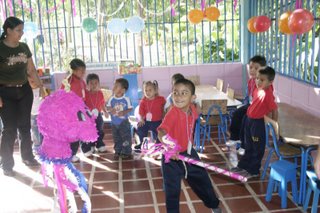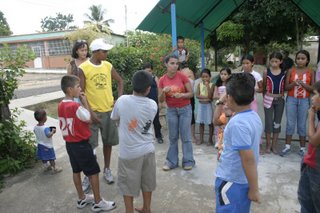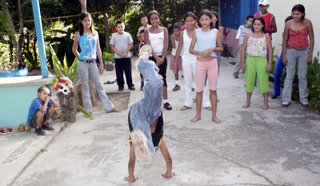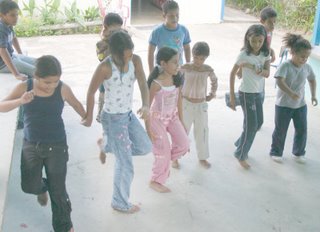
We celebrated the first day of preschool with a piñata shaped like Barney the Dinosaur. To be honest, I experienced a guilty pleasure in seeing small children attacking the extremely annoying TV character. I would have liked to have taken a few whacks myself. But as none of the children were able to break the piñata, the cheap thrill of seeing Barney take a beating faded as each child took his or her turn and the minutes mounted. Finally Luz Maria sliced Barney open so the kids could do the customary dive for candy and trinkets. A good time was had by all.
This past Saturday, Luz Maria and I visited the home of Jordi Duque (13), one of the recipients of a Children's Christian Concern Society scholarship in La Caramuca. Jordi's 15-year-old brother, Leonard, had been suffering from a combination of hepatitis and dengue fever. The fever seems to have passed after 12 days. We prayed with Leonard and his family for continued recovery.
Hepatitis perhaps needs no explanation, but for those of you unfamiliar with dengue fever, it is an infectious disease carried by mosquitoes found in tropical and subtropical areas, the primary carrier species being Aedes aegypti. Symptoms of classic dengue fever include high fever, skin rash and severe inflammation of the muscles and joints.
There is no vaccine for dengue fever and no treatment except for plenty of bed rest, fluids and acetaminophen to kill the pain. Although it is painful, most people (especially adults) recover from classic dengue fever in about two weeks. However, there are two other forms of the disease, dengue hemorrhagic fever and dengue shock syndrome, that can be fatal, especially to children. The chances of contracting these more dangerous forms of dengue fever increase with successive infections.
In our part of La Caramuca there has been a concerted effort to eliminate or disinfect the free-standing pools of water where the mosquitoes breed (this is the only way to control the spread of the disease). But Jordi, his mother and two brothers are extremely poor and live in a section where there is little effective sanitation. Jordi and his family live in a shack cobbled together from leftover pieces of wood and sheet metal. They have no indoor plumbing, only a basin for water out back.
However, their lot in life is improving as they have qualified for a government housing program in which a better house will be built for them. Concrete for the foundation will be poured this week.
Once again we would express our gratitude to Children's Christian Concern Society (CCCS) for providing scholarships for Jordi and 11 other children of needy families in La Caramuca. Based in Topeka, Kansas, CCCS supports Christian education in countries around the world. Here it is a struggle for many families to afford books and basic school supplies, and children often drop out of school after sixth grade.
It took some time, but Luz Maria finally completed her "overview of the Bible" course with the group in Punta Gorda. These were the last students to complete the course and Luz Maria found their last class to be a very positive experience. She was delighted that one man said he at last understood the image of the Cross was a symbol for Christ's suffering and atonement for the sins of all people and not an object of idolatry. To put this in context, Christian symbols in Venezuela are often used in a superstitious way. For example, it is common for people to paint a simple cross on the outside of their houses because they believe the image of the cross itself drives evil spirits away. Likewise, keeping a Bible open to Psalm 91 is supposed to guard against evil spirits during the night.
Even more important, he said he now understands how completely Christ's atoning death on the cross covers all sins and that one does not have to try and stay on God's good side by observing all kinds of rules that He has not commanded. One idea that many people have is that taking even one sip of an alcoholic beverage will send you straight to hell. This, too, is something of an overreaction against the prevailing culture. Abuse of alcohol and other drugs is widespread throughout Venezuela, and compounds the cycle of family instability and poverty in which so many are trapped.
We do not believe the Bible flatly condemns the consumption of alcohol, but following the teaching 1 Corinthians 8, we respect those who wish to break free of this cycle and see even the moderate use of alcohol as too much of a temptation. We do not ridicule them for this, and we strive to avoid even the appearance that we condone alcohol abuse. But we will not compromise the truth that we are saved through faith and not by works, especially by man-made codes of conduct, and we rejoice when someone recognizes this.
Pastor Edgar Brito has begun training me and other men to help him with the liturgy. For the last couple of years, his Sunday-morning congregation has been composed almost entirely of women, but that is changing. Two adult men were recently confirmed as members and two or three other men have said they wish to begin confirmation instruction. Pastor Edgar sees an opportunity to improve male participation in Sunday worship, consistent with our belief in male responsibility for leadership in the home and the church. This teaching is hard to get across in Venezuela where men to avoid responsibility in the home and the church, especially if the church seems to be dominated by women.
Pastor Edgar takes the liturgy very seriously. During our recent vacation Bible school, he explained the word "antiphon" to the children, which certainly going to more trouble than I would have. Members of the Corpus Christi congregation take the liturgy seriously, too. Another man told me what he liked about the appointed lectionary was that he could study the lessons for each Sunday for several hours the week beforehand, again quite putting me to shame.
Corpus Christi uses "Oficio Divino", a simple Spanish order of service developed by Edmund Mielke, a former Lutheran Church - Missouri Synod missionary to Venezuela. On Sundays without Holy Communion, the public confession and absolution of sins is followed by the service of the Word, in which the Apostle's Creed is recited prior to the sermon, which is followed by offering, prayers and closing benediction. On Holy Communion Sundays, the Nicene Creed is recited before the sermon and the Lord's Supper is celebrated between the prayers and the closing benediction.
"Oficio Divino" includes copious notes in the margins explaining the Biblical and other historical sources of the liturgy. It helped me greatly in my developing appreciation of the liturgy to understand how it was rooted in forms of worship used in the Old Testament as well as the first century and later eras of the Church.
There are talented people in the Corpus Christi congregation and one such person is Yelitza Valderrama. Yelitza tutors children during the week at Corpus Christi and also teaches Sunday school (her tutoring also is funded by CCCS). Her activities with the children include helping them to express themselves through dance (virtually all Venezuelans love to dance). There are Christian versions of popular music styles in Venezuela and Yelitza will slip a CD of these tunes in a boombox and choreograph a dance routine for the kids.
at Corpus Christi and also teaches Sunday school (her tutoring also is funded by CCCS). Her activities with the children include helping them to express themselves through dance (virtually all Venezuelans love to dance). There are Christian versions of popular music styles in Venezuela and Yelitza will slip a CD of these tunes in a boombox and choreograph a dance routine for the kids.
 People of Christ here are singing, yes, yes,
People of Christ here are singing, yes, yes,
Introducing a new style,
Powerful reggae music sounding,
People of Christ, He is the Lord that I will speak of to you,
And they ask me, What's up? What's up with the reggae?
The music that I sang before, forget it, forget it.
I want, I want my country for Christ,
 The words of salvation describe my song,
The words of salvation describe my song,
Because I want my nation for Christ,
I broadcast this message, that you may be aware,
Record in your mind that Jesus is coming in power,
All that I knew was lost, I had no other choice,
To find purpose in my life, I tried drugs and other bad things,
But one day I was able to see the sad reality and was able to change for the love of God.
H
No comments:
Post a Comment